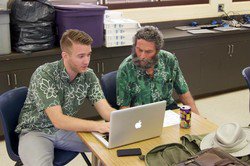Lessons to Help Rural Startups Overcome Obstacles
 By guest writer Sean Hookano-Briel, co-founder of Comprendio
By guest writer Sean Hookano-Briel, co-founder of Comprendio
My co-founder Dan Nash and I never planned on being businessmen. We were high school math teachers in central O’ahu, Hawaii who realized we could help students visually map concepts.We wondered what would happen if we used a master map as a way to engage, challenge, and provide feedback to our students as they learned new concepts.
So, we created a digital concept-mapping tool that creates a visual roadmap for student learning. It allows students to interact with their teacher’s plan for how various concepts are connected, to delve deeper into ideas featured, and collects data and assessment information as students move along the map.
Once we had a product, we needed people to recognize its value. We presented at a few schools and gave a TedxTalk. We hoped it was only a matter of time before our product spread like wildfire and piqued the interest of investors.
Then we realized we had some challenges that other ed-tech startups don’t face: we’re not near a large, urban area where we can share our work or train teachers on a mass scale. We’re on an island nearly 3,000 miles in the middle of the ocean.
So, what does it take to innovate in communities without access to people, investors, and large numbers of students? Here are three lessons we learned:
Get Back to Basics
Before our product was ever an app or website, it was a technique we were using with students on paper. As educational entrepreneurs, it’s important to ask ourselves, “Are we offering something that is as innovative in analog as it is digitally?” If not, the next question should be, “Why?” Technology is one half of the “ed-tech” concept, but the other (more important) half of it is “education.”
In rural communities, the likelihood of Internet access and frequency of use is lower than urban areas. It is possible that some of the people you connect with have little access to technologies in their classrooms or in their personal lives.
If you want to convince someone that you have something that can change their teaching, being able to sell a lower-tech version that touches on the foundational aspects of your concept could be what you need to create interest and investment in your ability to innovate overall.
Get Strategic
Not every spark is actually going to make a great fire. It’s important to see which sparks can actually turn into a flame.
An example: we saw potential for engagement with a large non-profit. In our eyes, it was a match made in heaven. After months of well-intentioned discussions, the opportunity never materialized. We couldn’t understand why and, worse, had burned up resources along the way.
Instead of taking it personally and wasting time with finger-pointing, we moved on to other opportunities. This made us reflect and re-focus our efforts.
In comparison, our state teacher’s union approached us with the idea to create a teacher professional development course using our product. Eventually that one course grew into four courses, which then grow to 15. These courses helped us create a weekly feedback loop with teachers, and allowed our business to stay alive.
We learned a powerful lesson: strategically focusing on our strongest partnerships led to lasting growth and revenue.
Free Isn’t Always Better
Being pedagogically sound and having great connections are essential, but you must get the product to customers. Many companies offer products for free, but in a small market,, giving something away doesn’t help your company stay alive. In fact, it can lead to less honest feedback; users are eager to say your solution is amazing if they don’t have skin in the game.
However, if someone is paying, they are more inclined to share honest feedback. By avoiding the free route and nurturing our union partnership, we were able to earn money to reinvest in the business and to expose to hundreds of educators to our product and get their feedback.
After realizing the struggles we faced living outside of the tech bubble, it would have been simple to step back, shrug and say, “it’s too hard.” Giving up is always the easy option.
Instead, we have seen this challenge as a valuable lesson learned. Working with students and educators in Hawai’i has pushed our creativity and problem-solving skills to new heights. We know if we focus on the basics, find that unwavering support, and embrace unfiltered feedback, we’ll always be able to chart our own course.
See also:
- Being in the Vanguard on Ed-Tech Innovation Presents Startup Challenges
- It’s Never Too Late to Accelerate Your Ed-Tech Startup
- Ed-Tech is Important, but People are a Key Ingredient to Startup Success
- Startup Shortcuts: Create Free Videos About Your Product
- Startup Shortcuts: How to Find Low-Cost Legal Services
- Startup Shortcuts: PowerPoint as a Free Graphics Editor
For more information visit @LearnComprendio on Twitter.

Such very amazing and free online web browser game,you can simple to play on this web browser hack 8 ball pool not hard and difficult game.